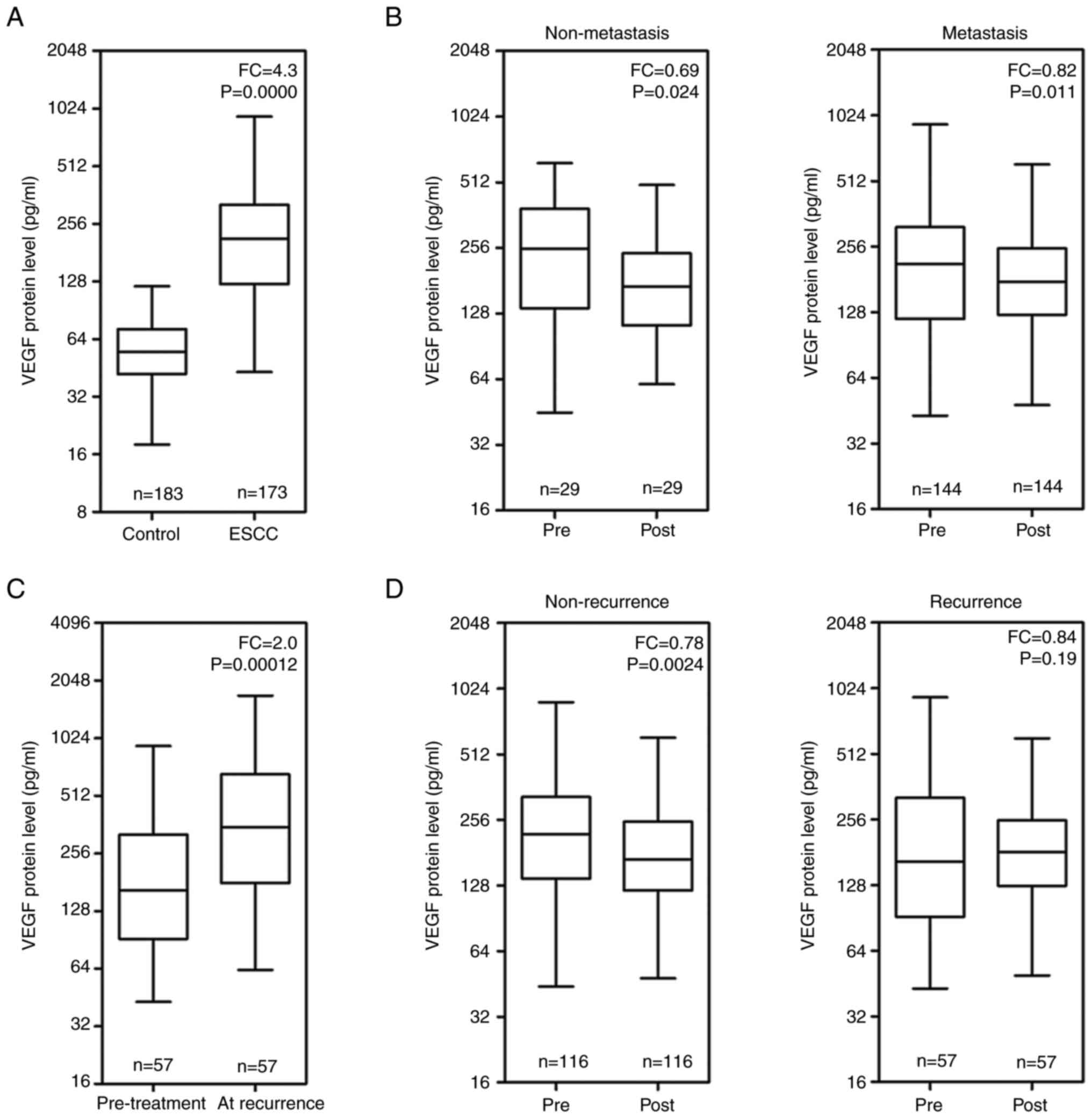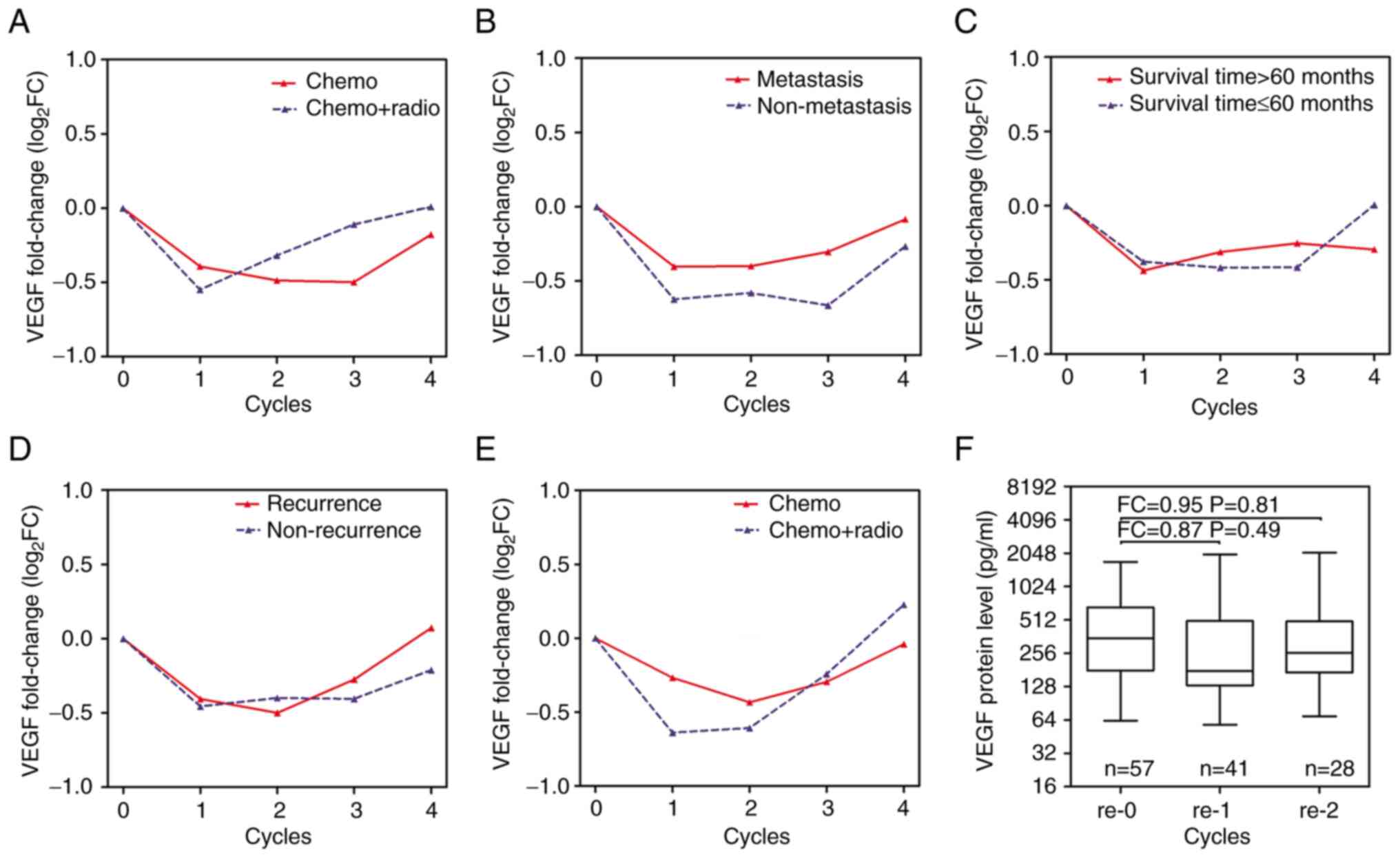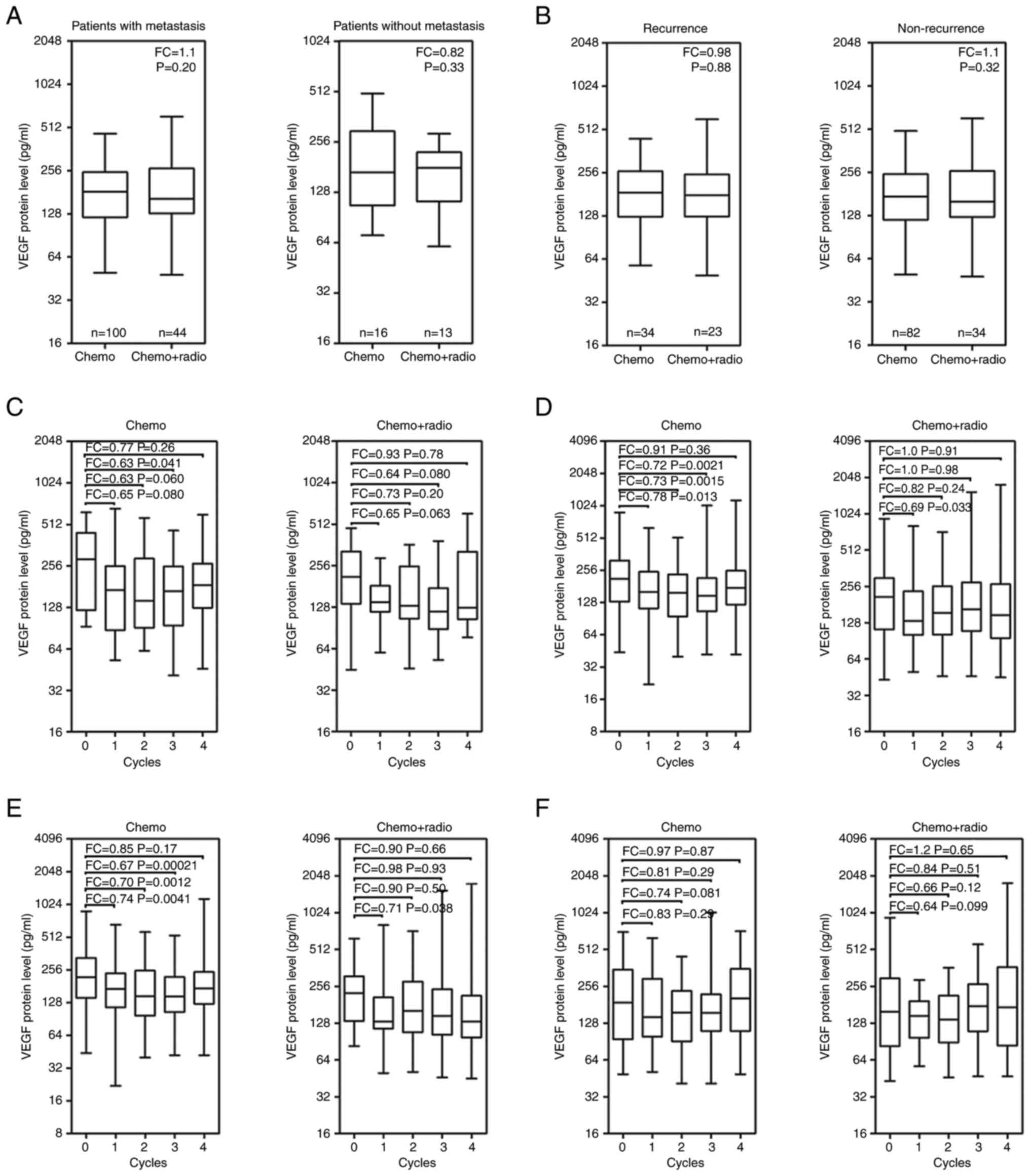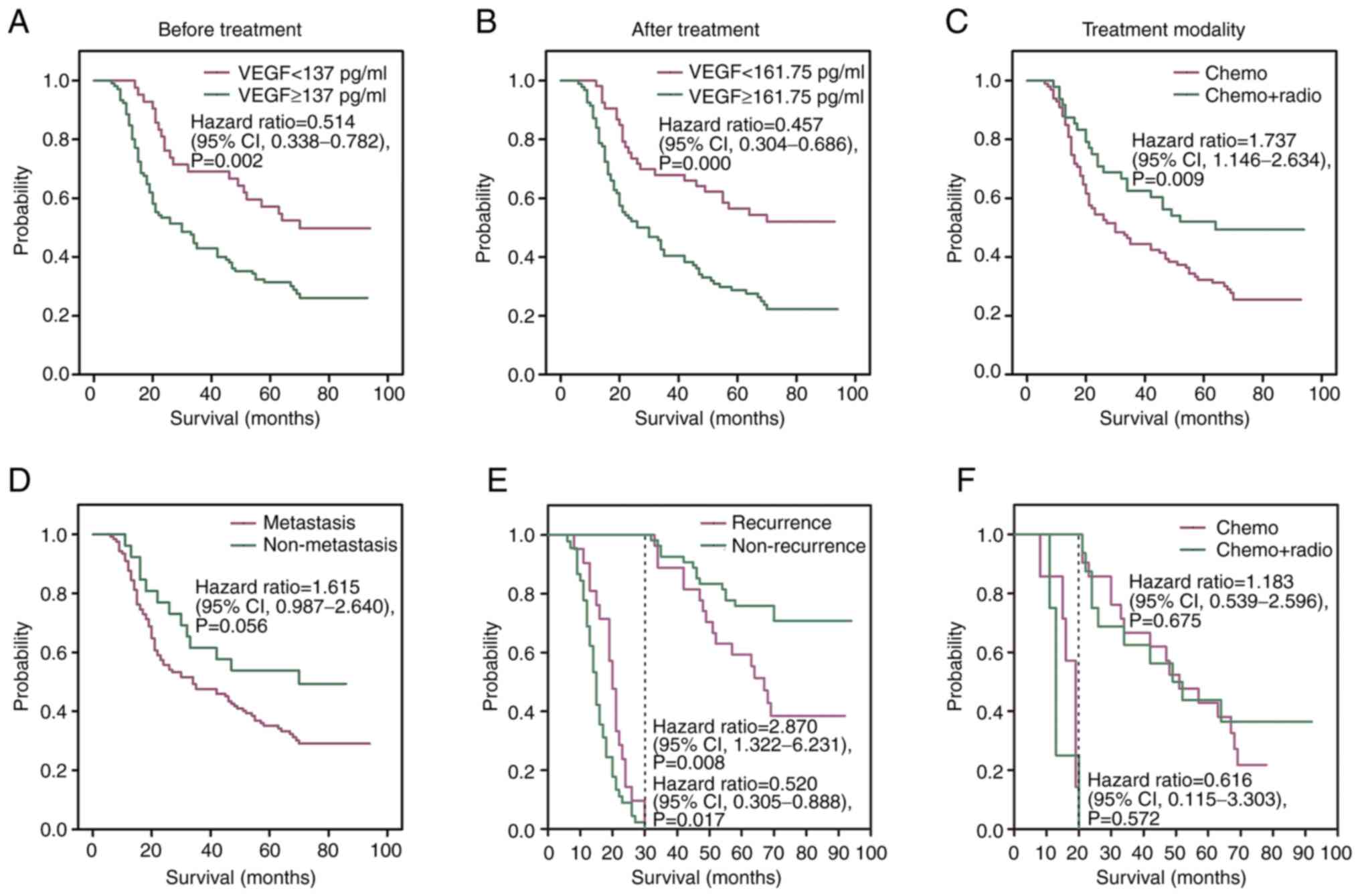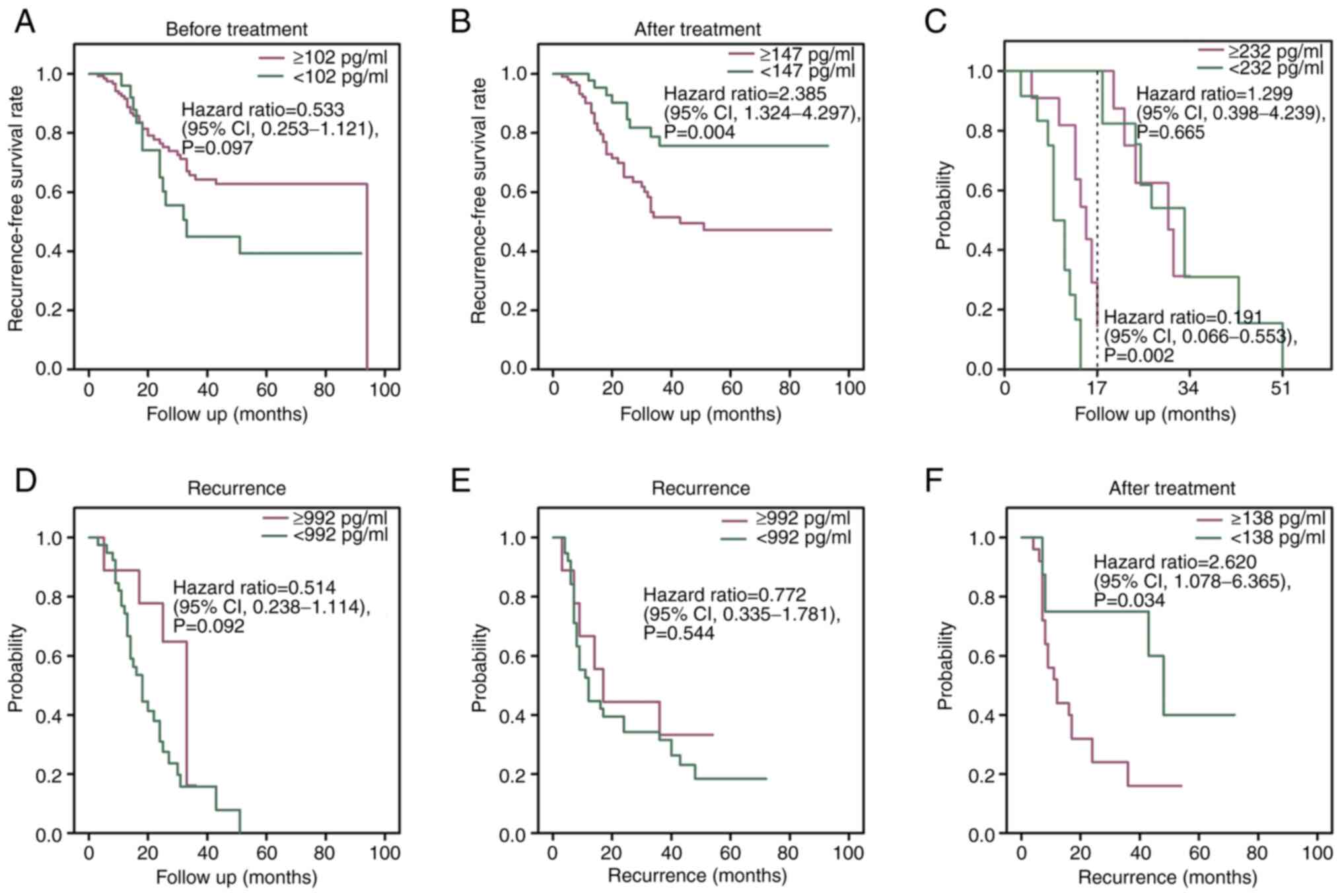|
1
|
Bray F, Ferlay J, Soerjomataram I, Siegel
RL, Torre LA and Jemal A: Global cancer statistics 2018: GLOBOCAN
estimates of incidence and mortality worldwide for 36 cancers in
185 countries. CA Cancer J Clin. 68:394–424. 2018.PubMed/NCBI View Article : Google Scholar
|
|
2
|
Siegel RL, Miller KD and Jemal A: Cancer
statistics, 2017. CA Cancer J Clin. 67:7–30. 2017.PubMed/NCBI View Article : Google Scholar
|
|
3
|
Huang FL and Yu SJ: Esophageal cancer:
Risk factors, genetic association, and treatment. Asian J Surg.
41:210–215. 2018.PubMed/NCBI View Article : Google Scholar
|
|
4
|
Li Y, Li Y and Chen X: NOTCH and
esophageal squamous cell carcinoma. Adv Exp Med Biol. 1287:59–68.
2021.PubMed/NCBI View Article : Google Scholar
|
|
5
|
Lordick F, Mariette C, Haustermans K,
Obermannová R and Arnold D: ESMO Guidelines Committee. Oesophageal
cancer: ESMO clinical practice guidelines for diagnosis, treatment
and follow-up. Ann Oncol. 27:v50–v57. 2016.PubMed/NCBI View Article : Google Scholar
|
|
6
|
Kang X, Chen K, Li Y, Li J, D'Amico TA and
Chen X: Personalized targeted therapy for esophageal squamous cell
carcinoma. World J Gastroenterol. 21:7648–7658. 2015.PubMed/NCBI View Article : Google Scholar
|
|
7
|
Liu Y, Xiong Z, Beasley A, D'Amico T and
Chen X: Personalized and targeted therapy of esophageal squamous
cell carcinoma: An update. Ann N Y Acad Sci. 1381:66–73.
2016.PubMed/NCBI View Article : Google Scholar
|
|
8
|
Cools-Lartigue J, Spicer J and Ferri LE:
Current status of management of malignant disease: Current
management of esophageal cancer. J Gastrointest Surg. 19:964–972.
2015.PubMed/NCBI View Article : Google Scholar
|
|
9
|
Smyth EC, Lagergren J, Fitzgerald RC,
Lordick F, Shah MA, Lagergren P and Cunningham D: Oesophageal
cancer. Nat Rev Dis Primers. 3(17048)2017.PubMed/NCBI View Article : Google Scholar
|
|
10
|
Chang SH, Kanasaki K, Gocheva V, Blum G,
Harper J, Moses MA, Shih SC, Nagy JA, Joyce J, Bogyo M, et al:
VEGF-A induces angiogenesis by perturbing the cathepsin-cysteine
protease inhibitor balance in venules, causing basement membrane
degradation and mother vessel formation. Cancer Res. 69:4537–4544.
2009.PubMed/NCBI View Article : Google Scholar
|
|
11
|
Wang C, Wang J, Chen Z, Gao Y and He J:
Immunohistochemical prognostic markers of esophageal squamous cell
carcinoma: A systematic review. Chin J Cancer.
36(65)2017.PubMed/NCBI View Article : Google Scholar
|
|
12
|
Chen YH, Lu HI, Lo CM, Wang YM, Chou SY,
Hsiao CC, Huang CC, Shih LH, Chen SW and Li SH: The crucial role of
blood VEGF kinetics in patients with locally advanced esophageal
squamous cell carcinoma receiving curative concurrent
chemoradiotherapy. BMC Cancer. 18(837)2018.PubMed/NCBI View Article : Google Scholar
|
|
13
|
Wang S, Chen X, Fan J and Lu L: Prognostic
significance of lymphovascular invasion for thoracic esophageal
squamous cell carcinoma. Ann Surg Oncol. 23:4101–4109.
2016.PubMed/NCBI View Article : Google Scholar
|
|
14
|
Araki K, Ohno S, Egashira A, Saeki H,
Kawaguchi H and Sugimachi K: Pathologic features of superficial
esophageal squamous cell carcinoma with lymph node and distal
metastasis. Cancer. 94:570–575. 2002.PubMed/NCBI View Article : Google Scholar
|
|
15
|
Song Z, Wang J, Lin B and Zhang Y:
Analysis of the tumor length and other prognosis factors in pT1-2
node-negative esophageal squamous cell carcinoma in a Chinese
population. World J Surg Oncol. 10(273)2012.PubMed/NCBI View Article : Google Scholar
|
|
16
|
Huang Q, Luo K, Chen C, Wang G, Jin J,
Kong M, Li B, Liu Q, Li J, Rong T, et al: Identification and
validation of lymphovascular invasion as a prognostic and staging
factor in node-negative esophageal squamous cell carcinoma. J
Thorac Oncol. 11:583–592. 2016.PubMed/NCBI View Article : Google Scholar
|
|
17
|
Xue LY, Qin XM, Liu Y, Liang J, Lin H, Xue
XM, Zou SM, Zhang MY, Zhang BH, Hui ZG, et al: Clinicopathological
parameters predicting recurrence of pT1N0 esophageal squamous cell
carcinoma. World J Gastroenterol. 24:5154–5166. 2018.PubMed/NCBI View Article : Google Scholar
|
|
18
|
Ye Z, Zhao H, Zhou W, Ye T, Geng C, Li X,
Yuan L, Du M, Xu H and Wang Q: Lower serum matrix
metalloproteinase-9 in metastatic patients with esophageal squamous
cell carcinoma after concurrent radiotherapy was significant for
prognosis. Onco Targets Ther. 13:12857–12866. 2020.PubMed/NCBI View Article : Google Scholar
|
|
19
|
Ma R, Xu H, Wu J, Sharma A, Bai S, Dun B,
Jing C, Cao H, Wang Z, She JX and Feng J: Identification of serum
proteins and multivariate models for diagnosis and therapeutic
monitoring of lung cancer. Oncotarget. 8:18901–18913.
2017.PubMed/NCBI View Article : Google Scholar
|
|
20
|
Njei B, McCarty TR and Birk JW: Trends in
esophageal cancer survival in United States adults from 1973 to
2009: A SEER database analysis. J Gastroenterol Hepatol.
31:1141–1146. 2016.PubMed/NCBI View Article : Google Scholar
|
|
21
|
Li B, Liu Y, Peng J, Sun C and Rang W:
Trends of esophageal cancer incidence and mortality and its
influencing factors in China. Risk Manag Healthc Policy.
14:4809–4821. 2021.PubMed/NCBI View Article : Google Scholar
|
|
22
|
Miyata H, Yamasaki M, Kurokawa Y,
Takiguchi S, Nakajima K, Fujiwara Y, Konishi K, Mori M and Doki Y:
Survival factors in patients with recurrence after curative
resection of esophageal squamous cell carcinomas. Ann Surg Oncol.
18:3353–3361. 2011.PubMed/NCBI View Article : Google Scholar
|
|
23
|
Lu J, Tao H, Song D and Chen C: Recurrence
risk model for esophageal cancer after radical surgery. Chin J
Cancer Res. 25:549–555. 2013.PubMed/NCBI View Article : Google Scholar
|
|
24
|
Oppedijk V, van der Gaast A, van Lanschot
JJ, van Hagen P, van Os R, van Rij CM, van der Sangen MJ, Beukema
JC, Rütten H, Spruit PH, et al: Patterns of recurrence after
surgery alone versus preoperative Chemoradiotherapy and surgery in
the CROSS trials. J Clin Oncol. 32:385–391. 2014.PubMed/NCBI View Article : Google Scholar
|
|
25
|
Liu Q, Cai XW, Wu B, Zhu ZF, Chen HQ and
Fu XL: Patterns of failure after radical surgery among patients
with thoracic esophageal squamous cell carcinoma: Implications for
the clinical target volume design of postoperative radiotherapy.
PLoS One. 9(e97225)2014.PubMed/NCBI View Article : Google Scholar
|
|
26
|
Guo XF, Mao T, Gu ZT, Ji CY, Fang WT and
Chen WH: Clinical study on postoperative recurrence in patients
with pN0 esophageal squamous cell carcinoma. J Cardiothorac Surg.
9(150)2014.PubMed/NCBI View Article : Google Scholar
|
|
27
|
Wang LS, Chow KC, Chi KH, Liu CC, Li WY,
Chiu JH and Huang MH: Prognosis of esophageal squamous cell
carcinoma: Analysis of clinicopathological and biological factors.
Am J Gastroenterol. 94:1933–1940. 1999.PubMed/NCBI View Article : Google Scholar
|
|
28
|
Aoyagi K, Kouhuji K, Yano S, Miyagi M,
Imaizumi T, Takeda J and Shirouzu K: VEGF significance in
peritoneal recurrence from gastric cancer. Gastric Cancer.
8:155–163. 2005.PubMed/NCBI View Article : Google Scholar
|
|
29
|
Zhang X, Wu Z, Peng Y, Li D, Jiang Y, Pan
F, Li Y, Lai Y, Cui Z and Zhang K: Correlationship between Ki67,
VEGF, and p53 and hepatocellular carcinoma recurrence in liver
transplant patients. Biomed Res Int. 2021(6651397)2021.PubMed/NCBI View Article : Google Scholar
|
|
30
|
Fujita N, Okegawa T, Terado Y, Tambo M,
Higashihara E and Nutahara K: Serum level and immunohistochemical
expression of vascular endothelial growth factor for the prediction
of postoperative recurrence in renal cell carcinoma. BMC Res Notes.
7(369)2014.PubMed/NCBI View Article : Google Scholar
|
|
31
|
Wang Y, Wang L, Yang Q, Li J, He M, Yao J,
Qi Z, Li B and Qiao X: Patterns of recurrence in patients with
stage pT3N0M0 thoracic esophageal squamous cell carcinoma after
two-field esophagectomy. Zhonghua Zhong Liu Za Zhi. 38:48–54.
2016.PubMed/NCBI View Article : Google Scholar : (In Chinese).
|
|
32
|
Li CL, Zhang FL, Wang YD, Han C, Sun GG,
Liu Q, Cheng YJ, Jing SW and Yang CR: Characteristics of recurrence
after radical esophagectomy with two-field lymph node dissection
for thoracic esophageal cancer. Oncol Lett. 5:355–359.
2013.PubMed/NCBI View Article : Google Scholar
|
|
33
|
Shen WB, Gao HM, Zhu SC, Li YM, Li SG and
Xu JR: Analysis of postoperative failure in patients with stage
pT3N0M0 thoracic esophageal
squamous cell carcinoma and consideration of postoperative
radiotherapy. World J Surg Oncol. 15(192)2017.PubMed/NCBI View Article : Google Scholar
|
|
34
|
The Cancer Genome Atlas Research, Analysis
Working Group: Asan University; BC Cancer Agency; Brigham and
Women's Hospital; Broad Institute; Brown University; Case Western
Reserve University; Dana-Farber Cancer Institute; Duke University
et al. Integrated genomic characterization of oesophageal
carcinoma. Nature. 541:169–175. 2017.PubMed/NCBI View Article : Google Scholar
|
|
35
|
Butkiewicz D, Gdowicz-Kłosok A, Krześniak
M, Rutkowski T, Krzywon A, Cortez AJ, Domińczyk I and Składowski K:
Association of genetic variants in ANGPT/TEK and VEGF/VEGFR with
progression and survival in head and neck squamous cell carcinoma
treated with radiotherapy or radiochemotherapy. Cancers (Basel).
12(1506)2020.PubMed/NCBI View Article : Google Scholar
|
|
36
|
Aggarwal S, Devaraja K, Sharma SC and Das
SN: Expression of vascular endothelial growth factor (VEGF) in
patients with oral squamous cell carcinoma and its clinical
significance. Clin Chim Acta. 436:35–40. 2014.PubMed/NCBI View Article : Google Scholar
|
|
37
|
Lai Y, Wang X, Zeng T, Xing S, Dai S, Wang
J, Chen S, Li X, Xie Y, Zhu Y and Liu W: Serum VEGF levels in the
early diagnosis and severity assessment of non-small cell lung
cancer. J Cancer. 9:1538–1547. 2018.PubMed/NCBI View Article : Google Scholar
|















